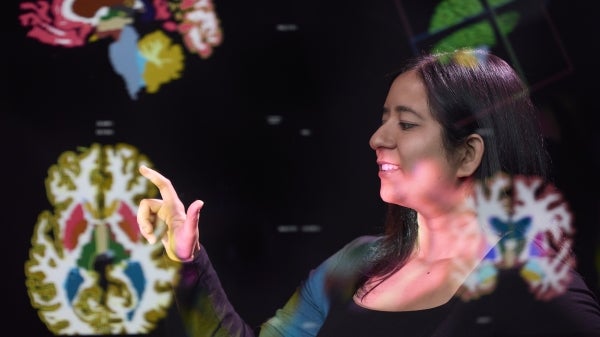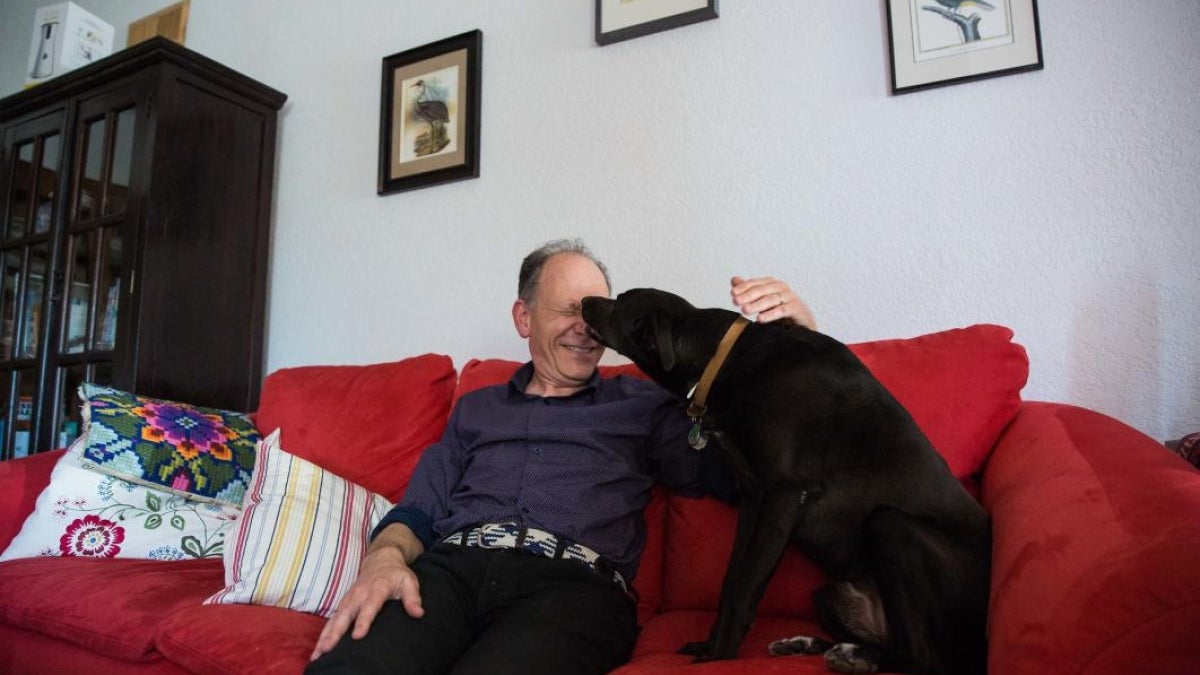A recent study published in “Circulation,” the journal of the American Heart Association, concludes that having a dog is associated with a lower risk of death in humans, especially in humans who have cardiovascular ailments. Other studies show that people with dogs exercise more, stress out less and have better self-esteem. What’s more, dogs offer a special kind of companionship to humans — love.
In fact, Arizona State University Professor Clive Wynne would say that a dog can steal your heart, something dogs actually have evolved to do.
Recently, ASU Now sat down with Wynne to discuss his latest book, “Dog is Love: Why and How Your Dog Loves You,” and his fascination with dogs and their wild relatives. Wynne is the director of the ASU Canine Science Collaboratory and a professor of psychology at ASU. His book tells us how his dog Xephos showed him what makes dogs so special, why dogs’ capacity to love makes them such suitable companions for humans and why we love them back.
Question: What motivated you to write “Dog is Love”?
Answer: For a very, very long time, it’s been my ambition to write a book that would appeal to a wide audience. Part of the inspiration is quite deep. My late father left school when he was 13, and he was always asking me to explain things in terms he might have a hope of understanding. So, there’s always been a voice in my head trying to explain things in really basic terms. It’s very rewarding to be able to speak and write in a way that a lot of people can understand. It’s part of being a university professor, I think. When I came to the view that the uniqueness of dogs lies in their capacity to form strong emotional connections, I had a strong sense that this was something people might be interested in.
Q: Do you have a favorite chapter in the book?
A: I love all my children equally (laughs). I don’t know. Do I have a favorite chapter? I think it’s important that the final chapter is “Dogs Deserve Better.” I think people who worry about dogs, like people who worry about anything, want scientists to step forward, and not just provide a deeper understanding of things, but provide guidance about how to live in the here and now. In the final chapter, I do come out and say how we should go about living with dogs.
Q: What about your dog Xephos?
A: She has her own chapter in the book!
Q: What’s her chapter about?
A: Her chapter is about how my family and I hadn’t had a dog for some time, and there came a point where we were ready to get a dog. As it happens, this dog came into my life just at the point where I felt that other people’s claims as to what makes dogs unique had ceased to work for me. I felt I had refuted them. Yet, I hadn’t come up with what I could propose as an alternative to what makes dogs unique. I knew there was something going on with dogs. They’re not like other species. But I could not articulate what it was. And this dog came into our life. She’s not smart. She’s not a pedigree. She’s not what people call beautiful, but I think she’s beautiful. She’s just a cute mutt. I call her the book’s spirit animal because she was trying to communicate something to me. Finally, the penny drops. She’s so affectionate — and this is what makes dogs special, what makes dogs unique. It’s this exaggerated, ebullient desire to form strong connections, and she taught me that.
Q: Tell me more about that.
A: When I come home, she’s crazy happy to see me. She uses her whole body to express her enthusiasm for being back with me. And when we are home together, she’s always nearby. She’ll follow me around, watch TV with me, lie down in my office and keep an eye on things while I’m working, just these everyday miracles. We have this ability to communicate emotionally even though we’re not closely related species.
We’re such different species. We have such different body shapes; yet, we read each other’s emotional expressions extremely well. When she tucks her tail between her legs, she’s anxious or unhappy. Humans don’t do that, but we read it instantly, intuitively. And dogs read our emotional expressions, too.
Q: I have to ask, what does it mean when a dog licks your face, or kisses you, as some would say?
A: The best research is that it’s a mark of deference. Whereas when we humans kiss each other, it’s affection. People haven’t studied this very much, but for dogs living with other dogs, it’s not kissing, it’s licking the corner of the mouth. Licking the corner of the mouth is a mark of deference among dogs, one dog to another. And allowing yourself to be licked on the corner of the mouth is an act of social superiority.
Q: You haven’t always studied dogs. What did you study before them?
A: I was always an animal psychologist, and like other animal psychologists I studied pigeons and rats and, later, marsupials while I was in Australia. The marsupials were fun. I came to studying dogs because when I came to the United States in 2002, I couldn’t continue to study marsupials, and I didn’t really want to go back to studying pigeons. I realized I wasn’t just interested in just animal minds. I was also interested in the human-animal relationship. I’m embarrassed to say it took me a couple of years to figure this out, but if you want to study human-animal relationships, there isn’t another animal that humans have had a more intense relationship with than dogs. I’ve been lucky. Since I turned to dogs, it’s been magic.
Upcoming dog-related events:
Loving Dogs
What: An evening with three leading experts on the powerful bond between people and their pooches.
When: 6–8 p.m., Thursday, Oct. 17.
Where: Arizona Science Center, 600 E. Washington St., Phoenix.
More details and purchase tickets
Canine Science Conference
What: A symposium of leading experts in academia in the field of canine behavior.
When: Various times, Oct. 18–20. See full schedule for details.
Where: Arizona Science Center, 600 E. Washington St., Phoenix.
More Science and technology

Podcast explores the future in a rapidly evolving world
What will it mean to be human in the future? Who owns data and who owns us? Can machines think?These are some of the questions pondered on a newly launched podcast titled “Modem Futura.” Co-…

New NIH-funded program will train ASU students for the future of AI-powered medicine
The medical sector is increasingly exploring the use of artificial intelligence, or AI, to make health care more affordable and to improve patient outcomes, but new programs are needed to train…

Cosmic clues: Metal-poor regions unveil potential method for galaxy growth
For decades, astronomers have analyzed data from space and ground telescopes to learn more about galaxies in the universe. Understanding how galaxies behave in metal-poor regions could play a crucial…
